- Home
- Rudy Rucker
As Above, So Below Page 9
As Above, So Below Read online
Page 9
It was a handsome interior space, brightly lit by hundreds of candles and painted in an intricate trompe l’oeil fashion, the air scented with cloves, nutmeg, and mace. Bruegel had been here before, as a matter of fact he’d helped when his Master Coecke had decorated this villa for the Fuggers nine years ago. The walls of the hall were set with pilasters painted to look like marble columns, and the ceiling was decorated to give the illusion of a round vault with a painting in the style of Michelangelo himself. It was all very up-to-date. The hall floor was covered with the largest Turkish rug in Antwerp—like a field of gems. Bruegel was glad to see the room, he’d never been invited to see its final finished state.
Glancing up at the imitation Michelangelo, Bruegel remembered mixing the paints for it, as Master Coecke lay up high upon a scaffold copying the picture from an engraving. To think that now he’d been to the Sistine Chapel himself. There were better ways to learn from Michelangelo than to copy him.
The tart, precise tones of a harpsichord drifted down the hall. And now, padding across the rug, here came a red-liveried Spanish servant with dark, slicked-back hair. “This is for Granvelle,” said Bruegel, holding up Plantin’s package. The servant made as if to take the bundle, but Bruegel hung on to it. “I must give this to the Bishop myself.” The servant shrugged and beckoned Bruegel to follow him down the hall.
They came to a music room with an intricately inlaid wooden floor, which was also the design of Coecke. The walls were hung with a legendary series of Habsburg tapestries called The Conquest of Tunis; apparently King Philip had installed them here for the duration of his stay. The tapestries brought back more memories, for they too were the design of Master Coecke.
The year after decorating the Fugger house, Coecke had traveled to North Africa as a court artist for Emperor Charles, commissioned to document Charles’s victories over the Turks. Coecke’s wife, Mayken, had been pregnant then. Yes, Master Coecke had gone off to Tunis leaving his blooming young wife alone with his apprentice in the house. Bruegel stared at the rich silks, at the gold and silver threads, briefly mesmerized by the glitter and by his memories of those days with Mayken. And then his eye roved on to the rest of the room. Where were his prospective patrons?
Chandeliers and sconces gleamed; the blazing hearth was so big that a man could stand inside it. Grouped near the fire were satin-covered couches and armchairs, with an ornate Hans Ruckers harpsichord to one side and a punchbowl upon an inlaid marble table. Sitting upon the highest chair was none other than King Philip II himself, a dark little man with thick lips and a bulldog’s lower jaw. Bruegel stuffed his hat inside his jerkin and ran his hand across the back of his head, pressing down upon the steadily throbbing pain.
Philip was so thin as to look ill; he put Bruegel in mind of a sickly newborn calf. Thinking of all the ill that Philip and his family had already brought upon the Low Lands, it crossed Bruegel’s mind how easy it would be to kick Philip to death. The memory of the physical violence he’d just undergone made the possibility seem quite real. He imagined the broken ribs sticking from Philip’s crushed chest. The intensity of the thought was invigorating.
The Foreigner was attended by two ministers and perhaps a dozen courtiers. The men were wearing suits of silk and velvet, with big round collars made up of yards and yards of folded Antwerp lace. The women were clad in breast-revealing gowns and their hair was twisted into fantastic, sculptural forms. Bruegel recognized some locals in the group, including the outspoken banker Anthonie Fugger and the financier Nicolas Jonghelinck, known as an intelligent connoisseur of the arts. A very good man for an artist to know. The servant went over to address a sensual-looking, blue-chinned man in bishop’s robes of red and yellow silk. Presumably this was Granvelle.
A Spanish noblewoman was playing the harpsichord; she looked up from her music and gave Bruegel a condescending glance. The woman was as thickly made up as a rose dipped into a pot of paint. Her large nostrils were holes in her face. Her black hair was stretched up high over two combs, like a pair of dog ears. For his part, Bruegel was still wearing his Carnival outfit: his gray tights and the fuzzy white tunic with the dirt-darkened leather jerkin. His bulging mirror remained slung across his back.
Bruegel’s eyes flickered from the harpsichordist to Philip to the courtiers, taking in the lineaments of the oppressors, letting his mind play with alterations of their shapes. He could see them as demons akin to foxes—or perhaps cats? What about insects? There was a sudden flash of black teeth in one of their faces, the teeth like the mouth parts of a beetle. It was Bishop Granvelle, smoothly gliding over to deal with the local craftsman.
“You come from Plantin?” said Granvelle in an indolent tone. “Let me see what he’s done.” He had something of a French accent.
Bruegel handed Granvelle the package. The Bishop unwrapped it and nodded with satisfaction. “Very cogent. Did you work on this, my man?”
“No, I’m merely a friend of Plantin’s. I’m Peter Bruegel the painter. Plantin couldn’t come because—”
“Yet another painter,” interrupted Granvelle with a weary sigh. His breath was so foul that Bruegel stepped away. “Antwerp teems with your ilk. I suppose you’re looking for patronage?” This was more than Bruegel had hoped for. The very heavens were swinging open at his advance. But he kept his head.
“I have patronage,” he said loftily. “I’ve designed several series of engravings for Jerome Cock. But I suppose, yes, I could find time for a commissioned painting.” Surviving the bandits’ attack seemed to have filled him with reckless insolence. To a man who’d nearly been killed, the ordinary affairs of life were laughably small.
Philip had been idly watching them talk, and now he asked Granvelle a question in Spanish. The two conversed for a minute and then Granvelle turned back to Bruegel.
“Could you paint that lady’s portrait?” asked Granvelle, indicating the harpsichordist. “If it comes out well, perhaps you might have the honor of painting His Royal Majesty.” The woman tossed her head and displayed a tight little smile, keeping her lips closed to cover her teeth. The tense muscles around her mouth seemed to form a snout. And there were signs of whiskers beneath the powder. She was a badger or, no, a bat.
“You wouldn’t like my portraits,” said Bruegel, recklessly. “I see you too clearly.” He caught himself. He was flying too high. “I could paint a Biblical scene for Your Worship. Or something classical. Or perhaps a fantasy in the style of Bosch?”
“Listen to the pigheaded Low-Lander,” said Anthonie Fugger, who was sitting nearby with a glass of spiced wine and spirits. He was a ducklike old man with big eyes and a broad, flat nose. “Take no offence, my dear Granvelle. Our Bruegel’s a competent lad. He helped Coecke decorate this house, and he’s made a reputation for himself with his Alpine engravings. What kind of Bible scene might you pick, Bruegel?”
“How about The Merchants Driven from the Temple?” riposted Bruegel. The words were popping out of his mouth faster than he could think.
Fugger cackled and smacked his lips. “Just the thing for a financier. I’d like to see that one. In a cityscape with Moorish architecture. In fact, I’d like you to copy the architectural details from our dear dead Coecke’s woodcuts of the Turks. Yes, I’ll commission such a painting from you, Bruegel. But, mind you, at no high price. See my secretary Williblad Cheroo about the details tomorrow. He can meet you at the Schilderspand. A little before noon.”
“You never told me why Plantin is not here himself,” said Granvelle to Bruegel. His voice had turned a bit cold.
“He was stabbed in the street by a Spaniard not one hour ago,” said Bruegel, secretly astonished at his temerity. “And I beg the favor to inquire if Your Worship might know the assailant? The villain was Moorish in appearance, with a high ponytail that had two dark, curling feathers in it. He had a pointed beard, a white jerkin, and loose-fitting black silk pants. He was accompanied by a red-shirted Walloon and by a pale, puffy one-armed man.” The description seemed t
o mean something to Granvelle, but for the moment he said nothing. “Allow me to sketch them for you and the others,” continued Bruegel. He felt in his tunic for pen, ink, and paper. As always, he had drawing supplies with him. He had the feeling he was talking too much and too loosely. It would be good to quiet down and draw.
“Very well,” said Granvelle with a negligent gesture. “Seat yourself and use this table. It’ll be a bit of entertainment for the court to see an Antwerp artist draw. Like watching a dog wet down a tree. It’s remarkable how prolific you people are.” Granvelle explained in Spanish to the courtiers what was going on, lisping and showing his shiny black beetle teeth. Philip himself looked over with a flicker of interest.
Bruegel leaned to his paper, his three attackers floating before his eyes. The throbbing in his head came back with them, but he pushed it away. His little pen warmed instantly to his touch, the ink flowed as readily as thought. It was a matter of minutes to limn the Spanish Moor, the Walloon mercenary, and the puffy man. A few of the grandees sauntered over to watch Bruegel at work. One, who wore a small ring in his nose, leaned over, first to study his reflection in the mirror on Bruegel’s back, and then to look at Bruegel’s drawing.
Upon seeing the image, the man with the nose-ring grunted and exclaimed “Hernando!” The others quickly agreed. “Hernando Lopez!” Bruegel stopped drawing and looked inquiringly at Granvelle.
“I thought as much myself from what you said before,” confirmed Granvelle. “Hernando Lopez is one of our quartermasters. He helps to organize the lodging and payment of our troops. Is the unfortunate Plantin gravely wounded?”
“The surgeon said that Plantin’s arm won’t be the same again,” said Bruegel. “And Plantin had done nothing to Lopez! It was a case of mistaken identity. Lopez drunkenly mistook Plantin for a musician he’d been fighting with at the Blue Boat.”
“Fie, fie,” said Nicolas Jonghelinck, speaking up for the first time. He was an alert, thin-lipped man with a pince-nez perched atop his long nose. He wore his hair cropped short and he had very large hands. “Justice must be served. This man Lopez must answer to our courts. If Spain wishes to avail herself of Antwerp’s financial institutions, she must respect our civic peace! Don’t you agree, Anthonie?”
Fugger nodded, and Jonghelinck’s pale blue eyes glared at Granvelle. As one of the Habsburg’s chief creditors, Fugger was in a position of some power just now.
Granvelle raised his eyebrows incredulously, but Jonghelinck and Fugger didn’t back down. So now Granvelle got into a brief discussion with King Philip.
“His Majesty requires Lopez’s continued services,” said Granvelle presently. “Lopez’s duties preclude his losing any time to your creaking provincial legal system. But His Majesty suggests a reparation. We will pay a sum to your Christopher Plantin. Reckon it into our loan, Señor Fugger, and give Plantin the money yourself. Philip and the other Habsburgs will, as always, be good for the bill.”
“I have enough Habsburg loans for now,” said Fugger. “You take this one on, Nicolas.”
“All right,” said Jonghelinck with a little smile. He nodded his smooth, oval head towards Philip and picked up Bruegel’s sketch with one of his large hands. “I fancy this, Bruegel. May I keep it?”
“Of course. You were good to intercede for Plantin.” It was hard to believe how well things were going.
“Don’t try being more of a skinflint than me, Nicolas,” put in old Fugger. “It’s impossible. Buy a painting from Bruegel instead of begging his scraps. I think it’s likely to be a sound investment.”
“Indeed,” said Jonghelinck, still admiring the sketch. “How about something classical? I think I’ve seen an etching of Daedalus and Icarus by you, Bruegel, have I not?”
“That’s right,” said Bruegel. “Done as a river landscape and printed by Hoefnagel. You’re well-informed, Mijnheer Jonghelinck.”
“Call me Nicolas. I’d like you to paint me a Fall of Icarus. A fresh composition, though. The etching’s design was a bit—opportunistic.”
“Yes,” said Bruegel excitedly. “Exactly! I’d like to paint it as a cosmic landscape, with a plowman on a hill in the foreground, a beautiful ship in the sea, and lots of blue in the sky and the water. I’ll show the great world rolling on, with Icarus’s fate very small.”
“That sounds promising. Think it out a little more, and we can discuss it tomorrow. As you’re going to the Schilderspand to meet Fugger’s man, I’ll be there at the same time.” Bruegel was high in the sky, his wings finally warmed by the sun.
Granvelle caught the acquisitive fever and chimed in. “Listen here, Señor Bruegel, why don’t you paint a Nativity for the court of Philip. Yes? Will you manage this matter for us, Jonghelinck? Arrange the payment for the painting from our loan, along with Flantin’s stipend.”
Dizzy with success, Bruegel bowed and backed out of the room. Three commissions! It was much more than he’d hoped. Get out while you can, Icarus!
He took away a final mental image of Philip and his court as toads and chickens. In the streets, sleet had begun to fall. For the first time in perhaps half an hour he remembered the ache in his head. He stuffed his cap with sleet and pressed it to the back of his head, singing and dancing a bit as he walked.
When Bruegel got back to his room above Cock’s Four Winds, he was too excited to sleep. He hung his mirror on the wall, lit a candle, and walked over to his big drawing table, perching on a stool. He pushed his current drawings to one side and made some quick calculations, trying to estimate the costs and labor of suddenly producing three paintings.
There were two separate issues: first, whether to paint upon linen or upon an oak panel; and, second, what liquid medium to grind his pigments with. Thanks to Coecke and Mayken Verhulst, Bruegel was skilled in watercolors, egg tempera, and oil. Though egg-and-oil paintings produced finer effects, watercolor dried much faster, and it would be easier to quickly finish three paintings using it. Well, perhaps Icarus could be in oil. He’d do that one last and make it the best of the three. As for the painting surface, the supercilious Granvelle could settle for linen, while Fugger and Jonghelinck would get panels of fine, seasoned oak. Bruegel finished his rough estimates of the costs and then made a quick little test sketch for a Fall of Icarus as a seascape. He put a ship in the corner, with Icarus’s little legs in a splash of water beside it. And on the horizon, a low blazing sun. Staring at the inked disk of the sun, Bruegel’s mind blanked out, and he sat there motionless for a few minutes, grinning and bedazzled.
And then he finally got in bed, lying facedown so as to spare the tender spot on his head. He hadn’t been asleep for more than an hour when there was a rapping at his door. It was Anja—cold, wet, and bedraggled.
“The Vanderheydens locked me out,” said Anja with a timid smile. “And when I broke a window trying to get in, the housekeeper popped out of her hole roaring that I’ve been dismissed, eh?”
“Poor Anja,” said Bruegel. “Not that I’m surprised. It wasn’t the right job for you. But listen to my news! Tonight I got commissions for three paintings!” Telling of his good fortune felt like uncovering a golden treasure. Almost a dream, but really true.
“How wonderful,” said Anja, stepping closer. “Can I share your bed, Peter? Like old times.” She threw her arms around Bruegel and attempted to give him a kiss.
“You’re chilled right through, Anja,” said Bruegel, hugging her, but turning his head to one side. He wasn’t sure he wanted to start up with Anja. Upon her recent arrival in Antwerp she’d made it quite clear that she’d be open to having sex with him. But Anja had always been a very practical girl, and Bruegel knew there’d be a price to pay for her favors. “Of course you can stay here. For tonight.” His room was really too small for two persons. “Let me find you a dry shirt to sleep in.”
“Why not nude?” said Anja into his shoulder, her voice very small. “It’ll be warmer. Remember when we were young, Peter, how we’d play at Adam and Eve?”
“I remember,” said Bruegel softly. He’d been wondering when she’d bring this up. “Our own Eden. Until your Serpent brother, Dirk, told the priest and the priest told your father, and Adam was expelled from the Garden.”
Anja’s father had sent Bruegel away to the boarding school of the Brothers of the Common Life, with his expenses funded by the ever-generous Graaf. All in all it had been for the best. Bruegel had learned a bit of Latin in s’Hertogenbosch, had seen some wonderful drawings by the immortal Bosch, and soon after that he and the Brothers had parted ways. Then he’d found a place as Master Coecke’s apprentice—and thus his career. It had been for the best, but he could still remember how, all those years ago, he and Anja had wept. She was warming in his arms. She was very soft. His headache was gone.
Anja tugged Bruegel’s beard, turning his face towards hers, and this time he let her kiss him. She smelled of beer. The kiss went on and on.
“I’ve missed you so, Peter,” said Anja presently. “Why can’t we live together now? We’ve no common ancestors. And we’re well out of Papa’s house. Let’s finish what we started, all those years ago. We’re free.”
Perhaps Bruegel had been free a moment ago, but now he felt as if he were plummeting from the sky. He struggled to stay aloft. “I’m—I’m not ready to marry,Anja.”
“We don’t need to marry, Peter,” said Anja in her sweetest tone. “You’ll be a lusty master and I your willing housemaid—” Anja reached down to feel Bruegel with an intimate, familiar hand. “Oh my. How you’ve grown.”
“Oh, Anja,” said Bruegel, and they sank into his bed.
When Bruegel woke, it was well past daylight. The first day of March. Sleeping Anja was nestled against him: warm, naked, and womanly. It was good to have her here. He felt a great sense of peace. If this was how it felt to fall from the sky to the sea, so be it. He had three commissions and his head felt fine.

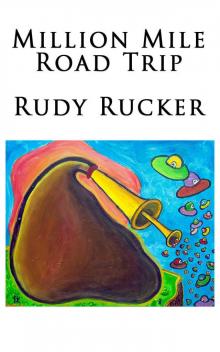 Million Mile Road Trip
Million Mile Road Trip Good Night, Moon
Good Night, Moon Transreal Trilogy: Secret of Life, White Light, Saucer Wisdom
Transreal Trilogy: Secret of Life, White Light, Saucer Wisdom Complete Stories
Complete Stories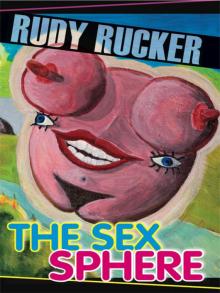 The Sex Sphere
The Sex Sphere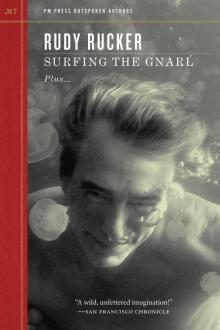 Surfing the Gnarl
Surfing the Gnarl Software
Software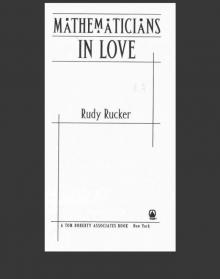 Mathematicians in Love
Mathematicians in Love Seek!: Selected Nonfiction
Seek!: Selected Nonfiction The Secret of Life
The Secret of Life The Hacker and the Ants
The Hacker and the Ants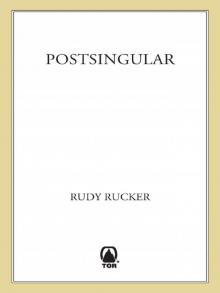 Postsingular
Postsingular Spaceland
Spaceland Transreal Cyberpunk
Transreal Cyberpunk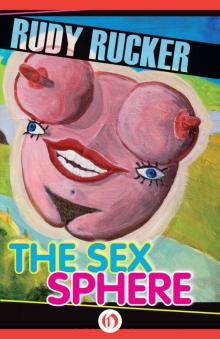 Sex Sphere
Sex Sphere Spacetime Donuts
Spacetime Donuts Freeware
Freeware The Ware Tetralogy
The Ware Tetralogy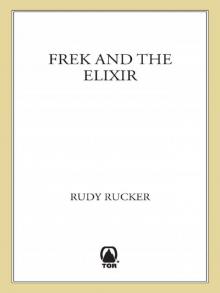 Frek and the Elixir
Frek and the Elixir Junk DNA
Junk DNA White Light (Axoplasm Books)
White Light (Axoplasm Books)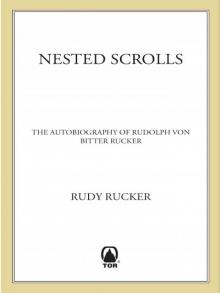 Nested Scrolls
Nested Scrolls Inside Out
Inside Out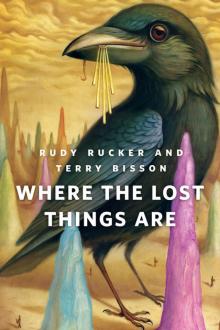 Where the Lost Things Are
Where the Lost Things Are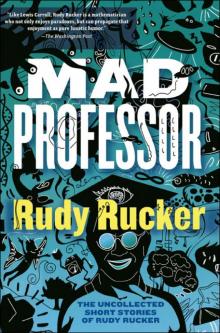 Mad Professor
Mad Professor As Above, So Below
As Above, So Below Realware
Realware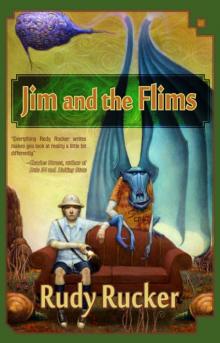 Jim and the Flims
Jim and the Flims Master of Space and Time
Master of Space and Time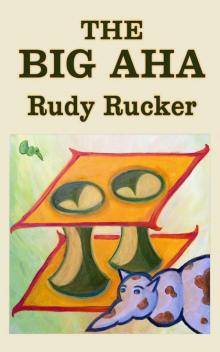 The Big Aha
The Big Aha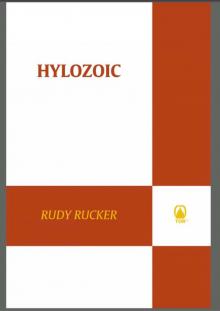 Hylozoic
Hylozoic